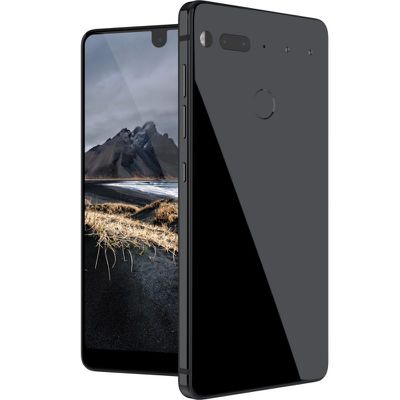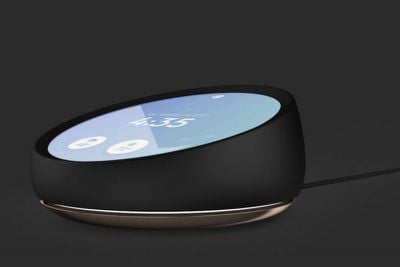New company Essential Products announced its debut products today, including a modular titanium smartphone with an edge-to-edge display and an Amazon Echo competitor. Andy Rubin, the founder of Essential and the original creator of the Android OS platform, announced the devices ahead of a talk he is scheduled to give later on Tuesday at the Code Conference.
The company's logo-free Essential Phone features a 5.71-inch edge-to-edge QHD display that reaches all the way to the top of the phone and runs around the 8-megapixel front-facing camera. The unique design is in contrast to Samsung's Galaxy S8, which retains a minimal bezel to house the camera and associated components.

The phone is constructed from titanium and ceramic, allowing it to survive a drop test "without blemish, unlike the aluminum competitor devices," the company claims. Apart from the fingerprint sensor and camera lenses, the rear of the device also features a modular accessory system that works via a pair of magnetic pins.
Initially, the "Click" cordless connector pins will hook up to the company's 360-degree camera and phone dock, with more modular products planned that Essential promises will "keep your phone cord-free, future-proof, and always up-to-date". A USB-C connector at the bottom of the phone provides the only other connectivity; no headphone jack is included.
The Essential Phone is powered by a Qualcomm 835 processor, 4GB of RAM, and has 128GB of storage, while its 13-megapixel rear-mounted dual lens camera includes a monochrome sensor and supports 4K at 30 frames per second. The phone runs some form of Android, but the company promises no extraneous software is pre-installed. Available in black, grey, white, and "Ocean Depths" colors, the phone will launch in the U.S. later this summer and cost $699.

Onto the company's new Amazon Echo competitor, the Essential Home. Details are still scant on the product, but here's what we know. The intelligent assistant device has a relatively inconspicuous puck-like shape with a sloping top that's dominated by a round touchscreen, which allows users to control music, ask general interest questions, set times, and control lights. It can be activated with a question, a tap, or even a "glance", according to Essential, suggesting some form of face detection.
The Essential Home will run the company's open platform Ambient OS, allowing it to interface with existing smart home products as well as SmartThings, HomeKit, Nest, and other popular standards. The intelligent assistant will also support notifications and reminders with contextual information displayed on-screen. Processing of user data is said to remain local to the device wherever possible. Pricing is yet to be announced, but the Essential Home is expected to ship later this summer.
Wired today published a write-up of Rubin's new Essential venture that provides some interesting background on the company. You can read the article here.
























Top Rated Comments
Doubt many people will buy it but it's always good when a company comes with fresh ideas.
Yeah, totally. /s
None need it, but some benefit from it because they're trying to do so much. Samsung phones typically have tons of extra services running and they eat up RAM. As Android O introduces picture in picture to all phones, I imagine having more RAM will be nice. But more RAM does need power to run, and so I do wish these companies would balance things a bit better.